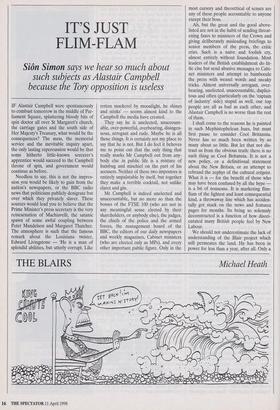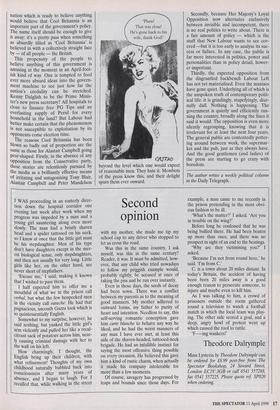IT'S JUST FLIM-FLAM
Sion Simon says we hear so much about
such subjects as Alastair Campbell because the Tory opposition is useless
IF Alastair Campbell were spontaneously to combust tomorrow in the middle of Par- liament Square, splattering bloody bits of spin doctor all over St Margaret's church, the carriage gates and the south side of Her Majesty's Treasury, what would be the consequences? The mess, the memorial service and the inevitable inquiry apart, the only lasting repercussion would be that some hitherto little-known sorcerer's apprentice would succeed to the Campbell throne of spin, and government would continue as before.
Needless to say, this is not the impres- sion you would be likely to gain from the nation's newspapers, or the BBC radio news that politicians publicly denigrate but over which they privately slaver. These sources would lead you to believe that the Prime Minister's press secretary is the very reincarnation of Machiavelli, the satanic spawn of some awful coupling between Peter Mandelson and Margaret Thatcher. The atmosphere is such that the famous remark about the Louisiana twister, Edward Livingstone — 'He is a man of splendid abilities, but utterly corrupt. Like rotten mackerel by moonlight, he shines and stinks' — seems almost kind to the Campbell the media have created.
They say he is unelected, unaccount- able, over-powerful, overbearing, disingen- uous, arrogant and rude. Maybe he is all those things. It is certainly not my place to say that he is not. But I do feel it behoves me to point out that the only thing that really marks Mr Campbell out from any- body else in public life is a mixture of humbug and mischief on the part of his accusers. Neither of these two impostors is entirely unpalatable by itself, but together they make a terrible cocktail, not unlike claret and gin.
Mr Campbell is indeed unelected and unaccountable, but no more so than the bosses of the F"TSE 100 (who are not in any meaningful sense elected by their shareholders, or anybody else), the judges, the chiefs of the police and the armed forces, the management board of the BBC, the editors of our daily newspapers and weekly magazines, Cabinet ministers (who are elected only as MPs), and every other important public figure. Only in the most cursory and theoretical of senses are any of these people accountable to anyone except their boss.
Ah, but the great and the good above- listed are not in the habit of sending threat- ening faxes to ministers of the Crown and giving deliberately misleading briefings to senior members of the press, the critic cries. Such is a naive and foolish cry, almost entirely without foundation. Most leaders of the British establishment do lit- tle else but send abusive messages to Cabi- net ministers and attempt to bamboozle the press with weasel words and sneaky tricks. Almost universally arrogant, over- bearing, unelected, unaccountable, duplici- tous and often (particularly on the 'captain of industry' side) stupid as well, our top people are all as bad as each other, and Alastair Campbell is no worse than the rest of them.
I shall come to the reasons he is painted in such Mephistophelean hues, but must first pause to consider Cool Britannia. Never has so much been written by so many about so little. But let that not dis- tract us from the obvious truth: there is no such thing as Cool Britannia. It is not a new policy, or a definitional statement about the New Britain, or an attempt to rebrand the zephyr of the cultural zeitgeist. What it is — for the benefit of those who may have been confused by all the hype is a bit of nonsense. It is marketing flim- flam of the lightest and least consequential kind, a throwaway line which has acciden- tally got stuck on the news and features pages for months. Its being so solemnly deconstructed is a function of how disori- entated many British people feel by New Labour.
We should not underestimate the lack of understanding of the Blair project which still permeates the land. He has been in power for less than a year, after all. Only a nation which is ready to believe anything would believe that Cool Britannia is an important part of the government's policy. The name itself should be enough to give it away: it's a pretty pass when something as absurdly titled as 'Cool Britannia' is believed in with a collectively straight face by — of all people — the British.
This propensity of the people to believe anything of this government is amusing at the moment in an April-fool- ish kind of way. One is tempted to feed ever more absurd ideas into the govern- ment machine to see just how far the nation's credulity can be stretched. Kenny Dalglish to be the Prime Minis- ter's new press secretary? All hospitals to close to finance free PG Tips and an everlasting supply of Persil for every household in the land? But Labour had better make certain that the phenomenon Is not susceptible to exploitation by its opponents come election time.
The reasons Cool Britannia has been blown so badly out of proportion are the same as those for Alastair Campbell going Pear-shaped. Firstly, in the absence of any opposition from the Conservative party, these stories are relentlessly pursued by the media as a brilliantly effective means of irritating and antagonising Tony Blair, Alastair Campbell and Peter Mandelson 44Sn° beyond the level which one would expect of reasonable men. They hate it. Members of the press know this, and their delight spurs them ever onward. Secondly, because Her Majesty's Loyal Opposition now alternates exclusively between invisible and incompetent, there is no real politics to write about. There is a fair amount of policy — which is the stuff that New Labour wants to see cov- ered —but it is too early to analyse its suc- cess or failure. In any case, the public is far more interested in politics, power and personalities than in policy detail, howev- er important.
Thirdly, the expected opposition from the disgruntled backbench Labour Left has not yet materialised. Even the maniacs have gone quiet. Underlying all of which is the unspoken truth of contemporary polit- ical life: it is grindingly, stupefyingly, diur- nally dull. Nothing is happening. The government is quietly and efficiently run- ning the country, broadly along the lines it said it would. The opposition is even more silently regrouping, knowing that it is irrelevant for at least the next four years. The general public are contentedly potter- ing around between work, the supermar- ket and the pub, just as they always have. And the good gentlemen (and ladies) of the press are starting to go crazy with boredom.
The author writes a weekly political column in the Daily Telegraph.



































































 Previous page
Previous page